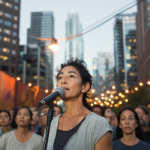In the ongoing debate about immigration in the United States, a critical aspect is often overlooked—the indispensable role that immigrants play in the nation’s healthcare system. Without these healthcare workers, particularly those in medically underserved areas, the U.S. would face severe staff shortages, placing an even greater strain on an already stretched healthcare system. In fact, as Anthony Pawelski highlighted in his piece for the American Immigration Lawyers Association (AILA), immigrants are foundational to healthcare across the country, not just in high-profile roles like doctors but also in less visible, yet equally critical, positions such as home health aides and hospital support staff.
Immigrant Physicians and Rural Healthcare
One of the most eye-opening statistics is that one in five physicians in the U.S. is an immigrant. In some medical specialties like geriatric medicine and nephrology, immigrants make up an astounding 50% of active physicians. In rural America, where medical professionals are in short supply, immigrant doctors are often the only primary care providers available. These medical professionals fill critical gaps, addressing the needs of aging populations and working in regions where U.S.-born physicians are reluctant to practice.
The importance of immigrant healthcare professionals is even more stark when viewed through the lens of the COVID-19 pandemic. Immigrant physicians and nurses stood on the front lines of the crisis, often at great personal risk. For instance, Filipino nurses, who account for only 4% of registered nurses, tragically represented 25% of COVID-related deaths among registered nurses .
A Workforce Beyond Doctors
However, it’s not just doctors and nurses who are essential. Immigrants make up 16% of the entire nursing workforce, and they are also a significant presence in home health care. As Baby Boomers age and the demand for elder care increases, immigrant healthcare workers are playing a pivotal role in providing in-home care for elderly, bed-ridden, or chronically ill patients. According to Pawelski’s article, immigrants comprise 25% of the health aid workforce, fulfilling physically and emotionally demanding roles that are becoming harder to fill.
Moreover, immigrant workers play essential roles in other hospital jobs, including room cleaning, nutrition services, and as interpreters for non-English-speaking patients. According to data from 2021, immigrants accounted for 3.56 million workers in the Healthcare and Social Assistance industry, demonstrating their broad contribution to the healthcare sector .
The Barriers of the Immigration System
Despite the clear necessity of immigrant healthcare workers, the U.S. immigration system has failed to adapt to the needs of the healthcare sector. For many healthcare professionals seeking permanent residency, the path to a green card is arduous, and the annual quotas for immigration have not been updated since 1991. As a result, highly skilled healthcare workers are often forced to endure years-long waits, a situation that severely impacts both the workers themselves and the communities that depend on them.
There is currently no fast-tracked immigration process for healthcare professionals, even though staffing shortages and retirements are expected to worsen. The lack of flexibility and accessibility in the current system poses a long-term risk to the U.S. healthcare workforce. As Pawelski and other immigration advocates point out, immigration reform is essential to building a resilient and adequately staffed healthcare system in the coming decades .
Conclusion: A Call for Immigration Modernization
The role of immigrants in U.S. healthcare is undeniable. From the front lines of the pandemic to rural clinics, immigrant healthcare workers have proven themselves to be invaluable. Yet, our immigration policies remain inflexible, creating a bottleneck that hinders their ability to continue making these crucial contributions. Without meaningful immigration reform, the U.S. healthcare system will likely face worsening staffing shortages, especially in underserved areas.
As Pawelski advocates, modernizing the immigration system is not just about fairness for immigrant workers; it’s about ensuring the future of healthcare in the U.S. At a time when the need for medical professionals is growing exponentially, immigrants continue to be an integral part of the solution, but they need the support of an updated immigration framework to fully thrive and serve where they are needed most.
Sources:
- Anthony Pawelski, Think Immigration: I Wish People Understood that the U.S. Healthcare System Depends on Immigrants (AILA Doc. No. 24071707), American Immigration Lawyers Association, July 18, 2024. Available at: Think Immigration





No responses yet